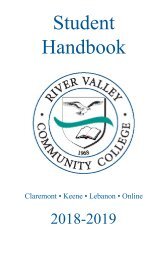Create successful ePaper yourself
Turn your PDF publications into a flip-book with our unique Google optimized e-Paper software.
To maintain New Hampshire’s positive economic indicators, including low unemployment and high per<br />
capita income, the State will need 65 percent of adults with education beyond high school. CCSNH is<br />
committed to achieving this vision by 2025. CCSNH acts as an engine for the State’s economy,<br />
graduating students with certificates and degrees of economic value to New Hampshire. The more<br />
students who attend, particularly from the existing workforce, the more quickly our State moves<br />
towards educational attainment rates required to meet new labor-economic needs.<br />
CCSNH is poised to meet these workforce challenges, as well as to provide the state with a more<br />
educated, civically engaged citizenry, as we partner with four-year universities as well. By launching<br />
careers, facilitating job switches and promotions, as well as seamless transfer to continued education<br />
at baccalaureate, master’s, and doctoral levels, CCSNH is in the business of making successful<br />
alumni.<br />
In order to maintain and grow our improved rates of student completion and achieve 65 by 25, we will:<br />
1. Assure clear pathways for students to credentials that lead to continuing education and strong career<br />
prospects, secured through partnerships with industry, four-year universities, and high schools<br />
2. Strategically meet enrollment needs for the State, including addressing the unique needs of our rural<br />
communities<br />
CCSNH will enable student success and academic operations in support of the above goals through<br />
conscientious stewardship of financial, human capital, and other assets and resources. We accomplish<br />
this by:<br />
1. Maintaining strong internal financial and facility controls and sustainability through sound budget,<br />
accounting, investment, and procurement operations<br />
2. Establishing CCSNH as an employer of choice<br />
3. Using data and technology to support our attainment goals<br />
Graduating in Programs of Value<br />
Much as enrollment has no meaning if students do not attain credentials of economic and educational<br />
value, credential attainment means little if the value it symbolizes is minimal. CCSNH must strive to<br />
keep its curriculum fresh and relevant through constant updates based on four-year University and<br />
employer and industry input. This is why all program descriptions, modifications, eliminations, and<br />
introductions must include – but not be limited to – the following attributes for ultimate approval:<br />
<br />
<br />
<br />
<br />
<br />
<br />
Career opportunities associated<br />
with program<br />
Data quantifying need for<br />
program change, elimination or<br />
introduction, including from labor<br />
economics sources such as NH<br />
Employment Security (NHES),<br />
EMSI (Labor Market Statistics),<br />
Bureau of Labor Statistics (BLS),<br />
or Burning Glass<br />
Job openings and wage<br />
information<br />
Proposed career steps upon<br />
workforce entry<br />
Evidence of early employer<br />
partnership<br />
<br />
<br />
<br />
<br />
<br />
<br />
<br />
Evidence of early four-year<br />
partnership<br />
Narrative of community<br />
impact/need<br />
Baccalaureate institutions to<br />
which a program transfers<br />
Proposed student outcomes<br />
Semester-by-semester listing of<br />
courses students should take<br />
Similarities to other programs at<br />
CCSNH and potential enrollment<br />
impact<br />
List of job titles associated with<br />
program<br />
178 | P a g e





